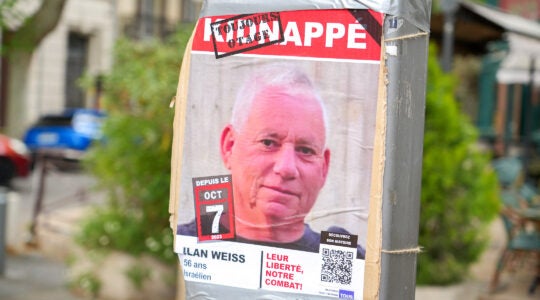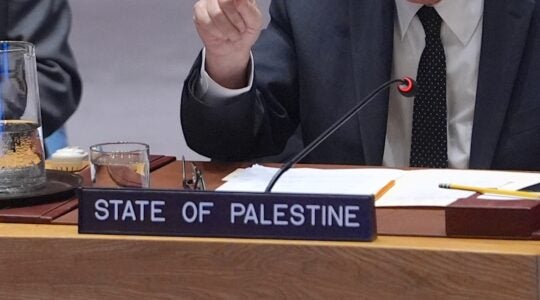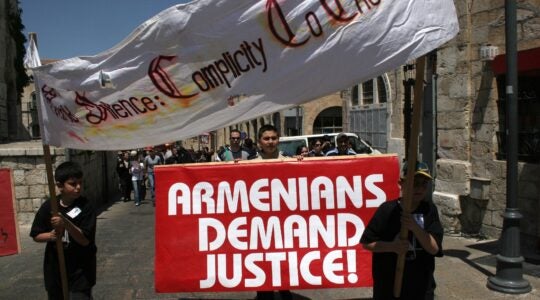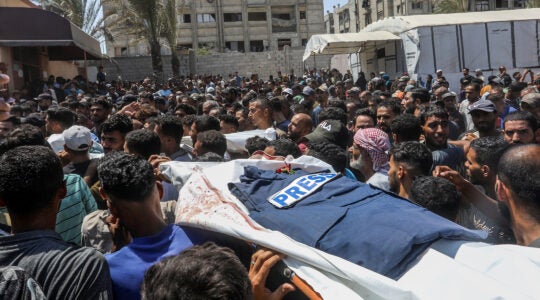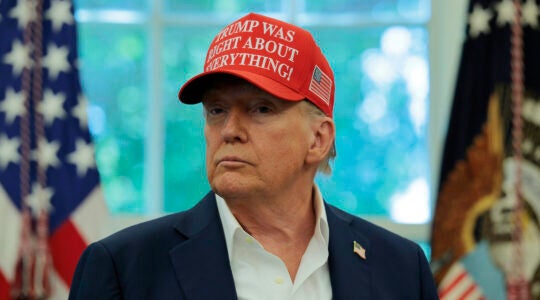NEWS ANALYSIS
WASHINGTON (JTA) — The evidence was neatly set out, the prescription precise. In some ways, the Obama administration’s foray this week into talks with Iran resembled an intervention more than a negotiation.
Administration officials went to Geneva with preparations and alliances firmly in place — some, apparently, for months.
Last week, on the eve of the first direct U.S.-Iran talks in years, President Obama joined by the leaders of France and Britain laid out the existence and scope of a second Iranian uranium enrichment plant underground near the holy city of Qom.
The facility had been kept secret by Iran, which insists its nuclear program is peaceful.
On Thursday in Geneva — in a coordinated effort that recruited not only staunch European allies, but Russia and China as well — the United States laid out what Iran must do next: Allow inspectors of the U.N. nuclear watchdog, the International Atomic Energy Agency, to visit Qom within two weeks, and hand over much of the uranium it has already enriched.
Obama made it clear in announcing the terms that the signal achievement was international agreement.
“The Iranian government heard a clear and unified message from the international community in Geneva,” he said Thursday. “Iran must demonstrate through concrete steps that it will live up to its responsibilities with regard to its nuclear program.”
U.S. officials outlined some of the steps that had been taken in advance of Thursday’s talks — in a process stretching back months and that until now has been kept closely under wraps.
Iran has been seeking new fuel to create isotopes for medical use; its existing supply, provided by Argentina in the early 1990s, will soon run out. Iran does not yet have the facility to enrich medical-use uranium.
The international community came back with an offer: Hand over the low-enriched uranium you’ve so far produced, and we’ll enrich it to medical levels. The Russians would handle the enrichment and the French would complete the manufacturing process, which precludes military use.
The Iranians accepted the deal.
“The potential advantage of this, if it’s implemented, is that it would significantly reduce Iran’s LEU stockpile which itself is a source of anxiety in the Middle East and elsewhere,” a senior administration official told reporters after the meeting, using the initials for low-enriched uranium.
The official’s conditional clause — “if it’s implemented” — was not a throwaway.
By agreeing to the imminent Qom inspection and the LEU tradeoff, Iran seemingly backed away from its earlier position on the talks, which outlined the Islamic Republic’s eagerness to discuss just about everything except its nuclear program.
But Israel, the United States and its European allies remain skeptical about Iran’s intentions, partly because of the cat-and-mouse uncertainties that dog all such nuclear standoffs: recent history is replete with drawn-out tales of inspectors landing in rogue nations and then being sequestered from key information.
Additionally, the intelligence agencies in these countries remain convinced Iran is seeking a delivery system. Its testing over last weekend of missiles that can reach Israel, parts of Europe and U.S. forces stationed in the region did little allay such anxieties.
Finally, the Iranian regime’s apparent willingness to manipulate the June 12 election results and crack down with force on protesters suggest depths of desperation to maintain power that had not previously been recognized in Western corridors of power.
Pro-Israel lobbyists and their allies in Congress remain ready to press forward on packages of sanctions now moving through the legislative process.
In the U.S. House of Representatives, Speaker Nancy Pelosi (D-Calif.) has said she is ready to move ahead if required, and U.S. Rep. Howard Berman (D-Calif.) has said that he is ready to remove the hold he has until now placed on sanctions legislation that has been stuck in the Foreign Affairs Committee he chairs.
In the U.S. Senate, Sen. Chris Dodd (D-Conn.) appears ready to lend his powerful imprimatur as chairman of the Banking Committee to similar legislation. Its outlines include expanded sanctions against Iran’s banking sector, and targeting its energy sector, including its import of refined petroleum — a product key to sustaining its ailing economy.
Pro-Israel groups were mostly united in saying they would press the sanctions issue if Iran did not make good on the commitments it made this week in Geneva.
“While the other items today — supplying Iran fuel for medical research and access to the Iran Revolutionary Guards Corps nuclear site — are interesting, the total end of uranium enrichment is the name of the game, as well as snap inspections, anywhere anytime,” said an official of a centrist pro-Israel group.
Opponents of sanctions were not likely to get much quarter from the left of the Jewish spectrum, according to a statement issued by J Street.
“Iran must match deeds to words by taking concrete steps immediately to demonstrate its commitment to nonproliferation, including action to open all of its nuclear facilities to IAEA inspection and fulfill its responsibilities under various international agreements,” J Street said. “Should Iran not fulfill its obligations, the international community must be prepared to move forward with increased economic and diplomatic pressure, including further sanctions.”
JTA has documented Jewish history in real-time for over a century. Keep our journalism strong by joining us in supporting independent, award-winning reporting.

